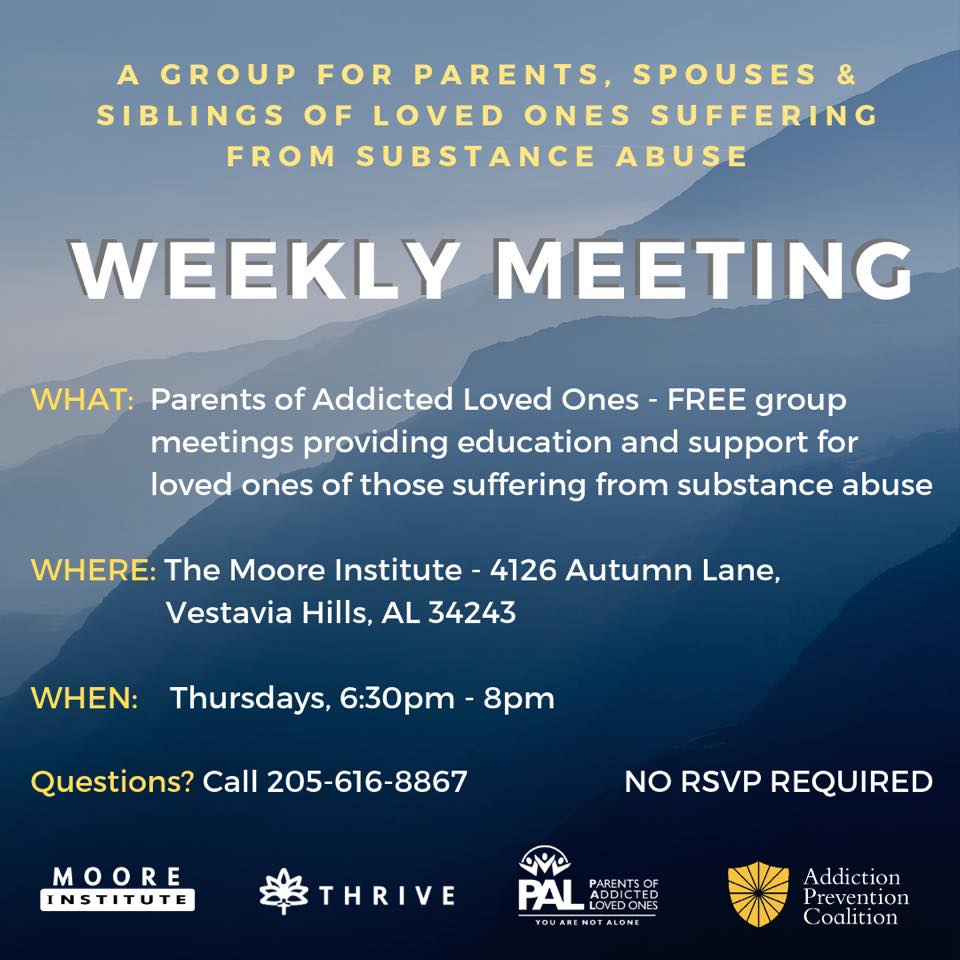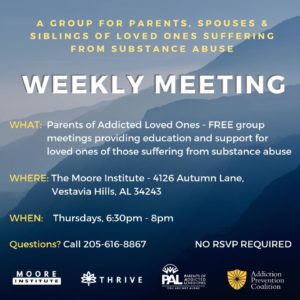
- This event has passed.
Parents of Addicted Loved Ones

Parents with a child addicted to drugs and/or alcohol can find hope in a support program called Parents of Addicted Loved-ones (PAL). PAL was founded in 2006 by Michael Speakman, LISAC, while working as an in-patient Substance Abuse Counselor in Arizona. As the number of meetings spread due to growing demand, volunteer facilitators were trained and new meetings opened across the Phoenix metropolitan area. In 2015, PAL was incorporated as a Christian run non-profit and falls under a 501c(3) for charitable donations as a partner with another Christian organization, Partners In Action. PAL meetings are open to anyone of any faith or background as our primary goal is to provide hope through education and support for parents dealing with addicted loved ones. PAL is now governed by a volunteer board.
“In working with men and women being treated for alcohol and drug addiction I witnessed how much the entire family is impacted,” Speakman says. “Parents in particular are confronted with challenges they’ve never had to face before. I saw how difficult it is for them to identify and work through these challenges alone. And that’s what they feel—alone.”
Many recount their relief when they first realized: “I don’t feel all alone with this problem anymore.” While in truth they were going through what most parents go through when placed in the same situation.
This is the founding principle of the PAL movement. People helping people through the woods. PAL groups meet weekly to educate, support and help each other with issues arising from loving someone with an addiction. Each PAL group is facilitated by a peer, someone walking the same path. While the focus is on parents with an addicted child, all family member and friends are welcome to attend PAL meetings.
The guiding principles of PAL are confidentiality, respect, acceptance and support. Differences in opinion are embraced without judgment and suggestions are offered in lieu of advice. Members are encouraged to “take what works and leave the rest.” Everyone experiences the journey at their own pace and is supported by the group regardless.
In most cases, the active addict acts like a child, displaying childish behaviors such as tantrums, sulking, disregard of consequences, irresponsibility, demand for immediate gratification and magical thinking. A husband or wife may experience the same immature behaviors of an addicted spouse, as a parent experiences with a child. Regardless, once the addiction has surfaced, it’s hard for family members to know what to do, what to expect.
We needn’t blame ourselves for not knowing what to do about an addicted loved one. There are no prep courses, no way to know exactly what to expect before it happens.
But there is a curriculum for recovery. If we learn it, if we follow it, it works. There is HOPE. And it comes from educating ourselves. When we focus on educating ourselves rather than changing the person who is using, it takes a lot of the pressure off everyone involved.
“Just finding out for sure that a loved one is using drugs or alcohol can be difficult,” Speakman says. “There can be a lot of lying and denial. Once you know for sure, the next question is: What now? This is where the educating begins and where PAL can really help. There are others who have walked before you, some walking along with you, and others right behind. But all are on the same path.”
But knowledge doesn’t happen overnight. “Life is a marathon, not a sprint,” Speakman says. “We don’t learn instantly, we learn over time. It’s incremental learning. So we need to be patient with ourselves.”

Some consider PAL an alternative or supplement to Al-Anon, the 12-step program for families, associated with Alcoholics Anonymous (AA). Today there are PAL meetings all around the United States with new ones getting started monthly.
Speakman founded PAL specifically for parents because, “There is no human relationship like that between parent and child,” he says. “As the saying goes. ‘When it comes to our children, every parent is blind.’ However, any family member is welcome, including spouses and adult children.”
PAL aims to help parents or other family members deal with issues arising from an addicted loved one. These issues tend to be more alike than different, which is precisely why these groups work. Members quickly realize they are not alone, a big relief in and of itself.
Once family members realize a loved one is indeed addicted to drugs or alcohol, the big question is: What now? More often than not this gives rise to a broad range of feelings: anger, guilt, fear, loss, denial.
“If you have an adolescent son or daughter with an addiction problem you may still have some control over their actions,” Speakman says. “You may still win at the negotiation table, the place where your life and their life collides. But, when your child turns 18 everything changes. Now, you lose at that table every time, even when it looks like you’re winning”.
That’s why parents get so angry. They wonder, why is this happening, how is this happening, what can I do to change it? Solving this mystery is the essence of the PAL curriculum.
There are two parts to a PAL group meeting: an educational component and a sharing component. Along with information about addiction and recovery, PAL uses stories and metaphors to help parents better understand what they are up against.
For instance, a first-time parent might be asked to picture their child’s age. They are often surprised to find they picture a 25-year-old son as a 15-year-old adolescent. This mental picture is important because it shapes how they decide to help, which can turn into enabling a grown man to act as a boy. Once parents realize this, they gain a better understanding of the problem and more clarity on possible solutions.
“It is important for parents to realize they did not cause their child’s addiction any more than they caused a condition like asthma or diabetes,” Speakman says. “Yet once they realize their child suffers from addiction, they can learn how best to help -just like with any other ailment.”

Getting involved in PAL is an important way to begin managing the ongoing issues surrounding an addicted child. Meetings are 90 minutes long and free of charge.
By attending PAL meetings, parents learn proven ways to help their loved one and ultimately how to find joy in life regardless of the choices their loved one makes.
“Adult children make their own choices and we’re not responsible for that,” says one parent member. “If we don’t set healthy boundaries and say ‘We’re not going to rescue you from the consequences of your choices,’ our adult children won’t get well. A healthy boundary lets them know ‘I love you, but you’re responsible for your decisions and their consequences. Not me.’”
PAL does not endorse any particular action or school of thought. The group is just one way for parents and spouses to educate themselves and prepare to make their own decisions. Members aren’t required to attend each week or follow every suggestion.
“It’s a really relaxed atmosphere where everyone offers support and encouragement to one another as they make positive changes,” Speakman says. “Not only does this help the parent. As parents change themselves and how they interact with their child, the child is more inclined to admit to a problem and seek help. It doesn’t always happen but it is our hope.”
Typical PAL meetings follow the same general pattern. Each meeting begins with prayer, followed by the stating of group guidelines (confidentiality, etc.), introductions, then exploration/discussion of an educational topic, such as:
- Delayed emotional growth
- Three promises to a loved-one
- Healthy Helping
- Enabling check-list
- The four stages of growth in recovery
- 13 family lessons about recovery
- Alcoholic/addict roles and family roles
- Re-entry, transitional living, and after-care
- 12 Principles of Healthy Adult Relationships
Lastly, members have an opportunity to share what’s going on in their present struggles or victories with their loved one and then the meeting ends with prayer.
Contact





